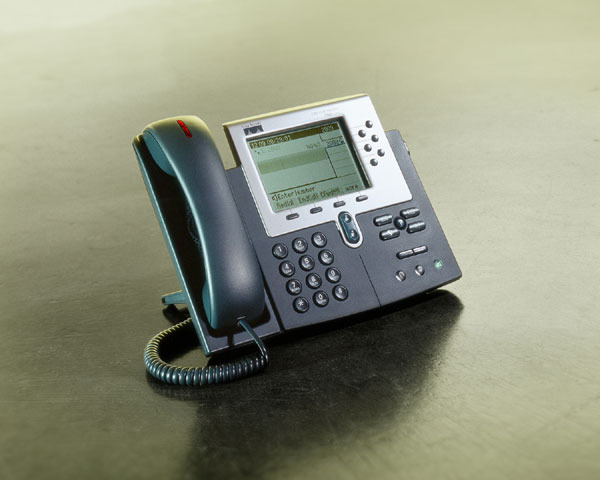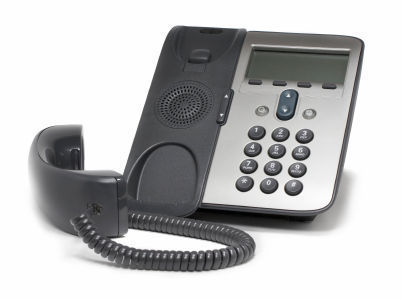VoIP Phones
VoIP phones are telephones which connect to VoIP networks instead of to the PSTN.
- VoIP phones with Ethernet connections
- VoIP phones with Wi-Fi / 802.11 connections
- VoIP phones with dialup modem connections
- Software VoIP phones
VoIP Phones with Ethernet connections
A VoIP phone with an Ethernet connection is the easiest type of VoIP telephone to use. Instead of a standard telephone RJ-11 connector to plug into the PSTN, these phones have RJ-45 connectors to plug into Ethernet networks.
The Ethernet connection is used to connect these VoIP phones to the VoIP server or VoIP gateway.

VoIP Phones with Wi-Fi / 802.11 connections
Wi-Fi (802.11) VoIP phones provide the same service as Ethernet VoIP phones, but they do it wirelessly.
A Wi-Fi enabled VoIP phone connects to a VoIP server or VoIP gateway through your existing Wi-Fi network.
VoIP Phones with Dialup Modem Connections
VoIP phones with dialup modem connections are very similar to VoIP phones with Ethernet connections.
Instead of connecting to an Ethernet network, these VoIP phones dialup over the PSTN to VoIP service providers.
Using a VoIP phone with a dialup modem connection requires a regular analog POTS telephone line, but enables long-distance and international calls to be made over VoIP networks, usually at a significant savings.
Software VoIP phones
Software VoIP phones turn your PC into a VoIP telephone.
Software VoIP telephones are less expensive than the choices listed above, if you already own a personal computer.
Hardware for Software VoIP phones
Software VoIP phones use the PC’s sound card, speakers or earphones, and microphone. This hardware works to emulate a telephone, even though this is not what the PC was designed for.
For better ease-of-use, many companies manufacture USB VoIP phones. These devices give your PC a normal-looking telephone handset or headset.
How to Choose a VoIP Phone
The first choice is determining if you want a hardware VoIP phone or a software VoIP phone.
Hardware phones are generally easier to use and do not require a PC. Software phones are usually less expensive and may offer better options for CTI (Computer Telephony Integration).
Choosing a VoIP Phone
With either a hardware or software VoIP phones, the major considerations remain the same:
- What VoIP call control protocols does the phone support?
- What VoIP codecsdoes the phone support?

- G.711
- G.722
- G.723
- G.726
- G.727
- G.728
- G.729
- ILBC
- Speex
- GSM – Full Rate
- GSM – Enhanced Full Rate
- GSM – Half Rate
- DoS FS-1015
- Does the phone support 3-way calling
- Does the phone support Do-Not-Disturb (DND)
- Does the phone support custom ringtones?
- Does the phone provide a method to work behind routers and NAT?
- Does the phone support STUN?
- Does the phone support Symmetric RTP?
- Does the phone support a SIP outbound proxy?
- Does the phone support QoS
- Does the phone support encryption?
Choosing a Hardware VoIP Phone
When selecting a hardware VoIP phone, you should consider these items:
- What connections does the VoIP phone support?
- Does the phone support IPv6?
- Does the phone support videoconferencing?
- Is the phone handset corded or cordless?
- Does the phone have a handset or a headset?
- Does the phone have a speakerphone?
- Does the phone have an LCD display?
- Is the LCD display backlit?
- Does the phone have good ergonomics?
- Do you like the style of the phones?
Choosing a Software VoIP Phone
If you choose a software VoIP phone, you should consider these items:
- Does the phone software support my Operating System?
- Is the phone software easy to use?
- Does the software support customizable skins?
- Does the software support videoconferencing?
- Does the software support shared whiteboarding?
And, of course, the final purchasing decision should always include price as a criteria.


Comments - No Responses to “VoIP Phones”
Sorry but comments are closed at this time.